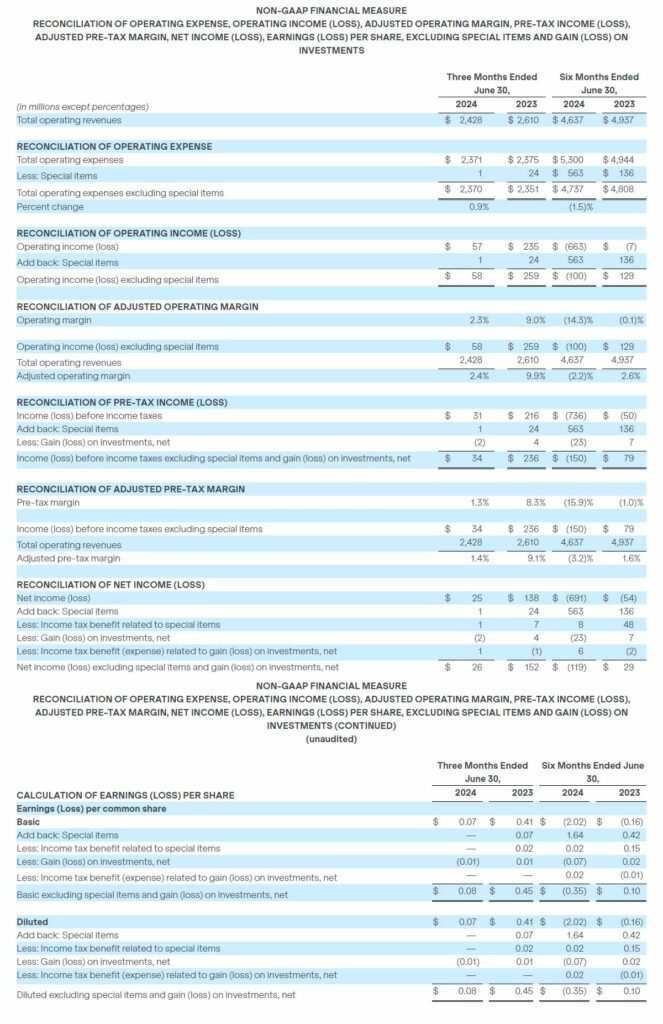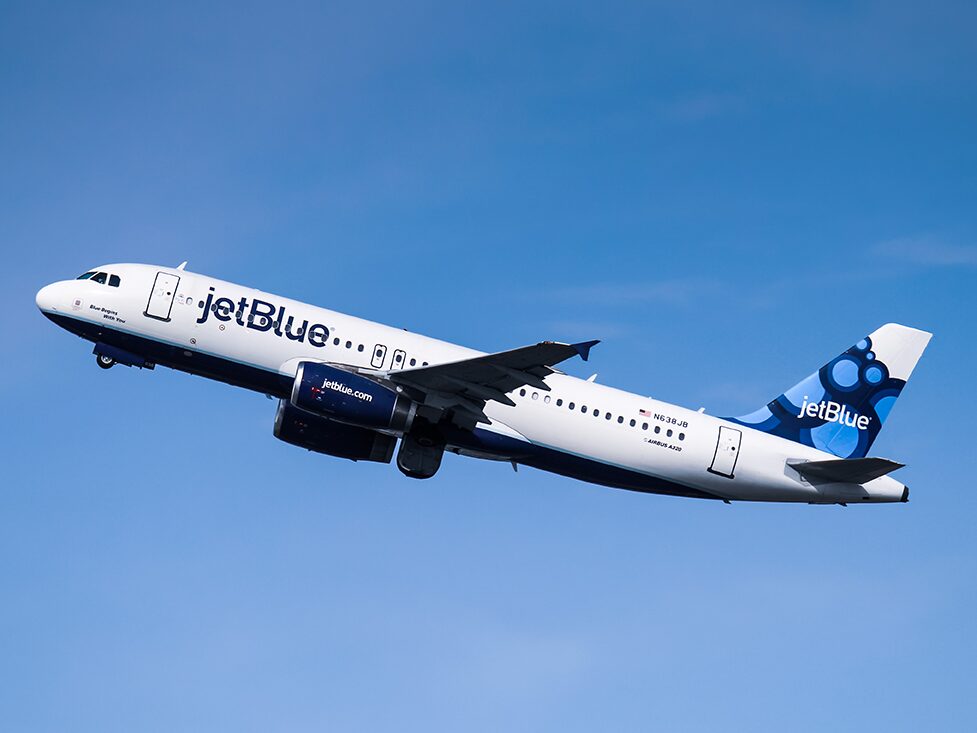
NEW YORK–(BUSINESS WIRE)– JetBlue Airways Corporation (NASDAQ: JBLU) reported its financial results for the second quarter of 2024.
“We closed the first half of 2024 with meaningful year-over-year improvements in our operation and exceeded our second quarter guidance through strong execution, early evidence the changes we are implementing as part of our refocused strategy are yielding positive benefits,” said Joanna Geraghty, JetBlue's chief executive officer. “Today, and as the year progresses, we are excited to share more details about JetForward, our strategic framework to return JetBlue to sustained profitability, and the four priority moves aimed at driving significant value over the coming years.
“These include boosting reliability and doubling down on our commitment to caring service to improve satisfaction and drive cost savings; reinvesting in building the best leisure network on the East Coast, where we are positioned to win; enhancing our existing product offerings and loyalty perks to better deliver the elevated and differentiated experiences our customers want; and keeping our costs low so that we can continue to offer customers exceptional value in the sky as we build a secure financial future for JetBlue.”
“In the second quarter, we continued to implement our JetForward strategy with the announcement of more significant network changes. We are actively reinvesting in our core geographies in New York, New England, Florida and Puerto Rico, while exiting routes and BlueCities that don't meet our financial hurdle rate. As we progress through the second half of the year, we'll be announcing additional initiatives designed to further enhance our customer value proposition, close the gap in our product offering to our peers and drive significant financial benefit,” said Marty St. George, JetBlue's president.
Four Priority Moves Underpin $800M – $900M Targeted Incremental EBIT from 2025 – 2027
- Reliable & Caring Service
- Improving on-time performance through multiple approaches including investments in tools and technology, designed to enable better planning and recovery.
- Delivering outstanding customer service and a consistent experience, from pre-booking to post-travel.
- Best East Coast Leisure Network
- Refocusing our network around leisure flying originating in New York, New England, Florida and Latin geographies.
- Recently announced new routes to meet our core customers' needs by doubling down on leisure flying in New England, including adding Manchester, New Hampshire to our network, the tenth airport with JetBlue service in New England.
- Announced four tranches of network changes to-date culminating in 15 BlueCity closures and over 50 route exits as we reduce unprofitable flying.
- Products & Perks Customers Value
- Enhancing our product offerings and loyalty perks to attract customers that value high quality and premium experiences.
- Optimizing product merchandising to maximize revenue potential, including through the recent addition of a complimentary carry-on bag to our Blue Basic fare.
- A Secure Financial Future
- Sustaining our historical cost advantage through our new business cost transformation program, enabled by data-science driven optimization, new technology investments, and labor & infrastructure productivity, which is forecasted to drive $175 million of structural cost savings through 2027.
- Restoring balance sheet health through capital discipline, including deferring approximately $3.0 billion of capital expenditures through 2029, designed to also improve our cash flow outlook.
“ While many of these underlying initiatives will take time to ramp to their full potential, with the strong foundation of JetForward, we are poised to generate $800 – $900 million of incremental EBIT from 2025 through 2027 and expect the benefit to be realized evenly over those three years,” said Ursula Hurley, JetBlue's chief financial officer. “We are setting ourselves on a path to restore our balance sheet health, and in support of securing our financial future, we are announcing an incremental aircraft deferral of approximately $3 billion of planned capital expenditures. Our focus going forward will be on driving value from our existing asset base and, ultimately, generating positive free cash flow.”
Second Quarter 2024 Financial Results
- Net income for the second quarter of 2024 under Generally Accepted Accounting Principles (“GAAP”) of $25 million or $0.07 earnings per share. Excluding special items, adjusted net income for the second quarter of 2024 of $26 million (1) or $0.08 (1) earnings per share.
- Second quarter 2024 system capacity decreased by 2.7% year-over-year.
- Operating revenue of $2.4 billion for the second quarter of 2024, down 6.9% year-over-year.
- Operating expense of $2.4 billion for the second quarter of 2024, a decrease of 0.1% year-over-year.
- Operating expense per available seat mile (“CASM”) for the second quarter of 2024 increased 2.6% year-over-year.
- Operating expense, excluding special items for the second quarter of 2024, increased 0.9% (1) year-over-year.
- Operating expense per available seat mile, excluding fuel, other non-airline operating expenses, and special items (“CASM ex-Fuel”) (1) for the second quarter of 2024 increased 3.7% (1) year-over-year.
- Average fuel price in the second quarter of 2024 of $2.87 per gallon.
Second Quarter 2024 Key Highlights
- Continued implementation of refocused strategy through network optimization announcements, improved merchandising efforts and initial progress on multi-year reliability initiative.
- Delivered improved operational performance year-over-year with a completion factor of 98.8%, up from 97.8% in 2Q23.
- Progressed on our $300 million 2024 revenue initiative target, delivering ~$140 million of incremental top-line benefit year-to-date.
- Executed on our cost initiatives, as evidenced by structural cost program savings of ~$145 million to-date and fleet modernization cost avoidance of $83 million to-date.
- Ended the quarter with ~$1.6 billion in liquidity, excluding our undrawn $600 million revolving credit facility.
Outlook
“As we execute on our strategy to return to profitability, we remain focused on delivering on our near-term financial goals. In the second half, we expect sequential year-over-year unit revenue momentum to bolster the top-line, supported by our $300 million of revenue initiatives and the continuing normalization of competitive capacity in our core geographies,” said Marty St. George.
| Third Quarter and Full Year 2024 Outlook | Estimated 3Q 2024 | Estimated FY 2024 |
| Available Seat Miles (“ASMs”) Year-Over-Year | (6.0%) – (3.0%) | (5.0%) – (2.5%) |
| Revenue Year-Over-Year | (5.5%) – (1.5%) | (6.0%) – (4.0%) |
| CASM Ex-Fuel (1) Year-Over-Year (2) | 6.0% – 8.0% | 6.5% – 8.5% |
| Fuel Price per Gallon (3), (4) | $2.82 – $2.97 | $2.80 – $3.00 |
| Capital Expenditures | ~$365 million | ~$1.6 billion |
“We've faced a number of unit cost headwinds this year, including approximately one point of pressure from the change in recognition of Pratt & Whitney compensation and one point from lower capacity than planned, yet we are maintaining our full year CASM-ex Fuel (1) guidance and now expect it be in the range of 6.5% – 8.5% for the full year,” said Ursula Hurley. “We remain committed to cost execution in the second half of the year, when we expect our structural cost program to ramp to run-rate and we introduce our new cost transformation program as part of JetForward.”
Earnings Call Details
JetBlue will hold a conference call to discuss its quarterly earnings today, July 30, 2024 at 10:00 a.m. Eastern Time. A live broadcast of the conference call will also be available via the internet at http://investor.jetblue.com . The webcast replay and presentation materials will be archived on the company’s website for at least 30 days.
For further details, see the second quarter 2024 Earnings Presentation available via the internet at http://investor.jetblue.com .
About JetBlue
JetBlue is New York's Hometown Airline ® , and a leading carrier in Boston, Fort Lauderdale-Hollywood, Los Angeles, Orlando and San Juan. JetBlue, known for its low fares and great service, carries customers to more than 100 destinations throughout the United States, Latin America, the Caribbean, Canada and Europe. For more information and the best fares, visit jetblue.com .
Notes
| (1) | Non-GAAP financial measure; Note A provides a reconciliation of each non-GAAP financial measure used in this release to the most directly comparable GAAP financial measure and explains the reasons management believes that presentation of these non-GAAP financial measures provides useful information to investors regarding JetBlue's financial condition and results of operations. In addition, refer to Note A for further details on non-GAAP forward-looking information. |
| (2) | Includes the impact from labor agreements of approximately two points for each of the third quarter and the full year 2024. |
| (3) | Includes fuel taxes, hedges and other fuel fees. |
| (4) | JetBlue utilizes the forward Brent crude curve and the forward Brent crude to jet crack spread to calculate the unhedged portion of its current quarter. Fuel price is based on forward curve as of July 12, 2024. |
Forward-Looking Information
This Earnings Release contains forward-looking statements within the meaning of the Private Securities Litigation Reform Act of 1995, as amended. We intend such forward-looking statements to be covered by the safe harbor provisions for forward-looking statements contained in Section 27A of the Securities Act of 1933, as amended (the “Securities Act”), and Section 21E of the Securities Exchange Act of 1934, as amended (the “Exchange Act”). All statements other than statements of historical facts contained in this Release are forward-looking statements. In some cases, you can identify forward-looking statements by terms such as “expects,” “plans” “intends,” “anticipates,” “indicates,” “remains,” “believes,” “estimates,” “forecast,” “guidance,” “outlook,” “may,” “will,” “should,” “seeks,” “goals,” “targets” or the negative of these terms or other similar expressions. Additionally, forward-looking statements include statements that do not relate solely to historical facts, such as statements which identify uncertainties or trends, discuss the possible future effects of current known trends or uncertainties, or which indicate that the future effects of known trends or uncertainties cannot be predicted, guaranteed, or assured. Forward-looking statements contained in this Earnings Release include, without limitation, statements regarding our outlook and future results of operations and financial position, including our expected return to profitability, expectations with respect to our headwinds, and our business strategy and plans and objectives for future operations, including our refreshed standalone strategies, such as JetForward. Forward-looking statements involve risks, uncertainties and assumptions, and are based on information currently available to us. Actual results may differ materially from those expressed in the forward-looking statements due to many factors, including, without limitation, the risk associated with the execution of our strategic operating plans in the near-term and long-term; our extremely competitive industry; risks related to the long-term nature of our fleet order book; volatility in fuel prices and availability of fuel; increased maintenance costs associated with fleet age; costs associated with salaries, wages and benefits; risks associated with a potential material reduction in the rate of interchange reimbursement fees; risks associated with doing business internationally; our reliance on high daily aircraft utilization; our dependence on the New York metropolitan market; risks associated with extended interruptions or disruptions in service at our focus cities; risks associated with airport expenses; risks associated with seasonality and weather; our reliance on a limited number of suppliers for our aircraft, engines, and our Fly-Fi® product; risks related to new or increased tariffs imposed on commercial aircraft and related parts imported from outside the United States; the outcome of legal proceedings with respect to the NEA and our wind-down of the NEA; risks associated with cybersecurity and privacy, including information security breaches; heightened regulatory requirements concerning data security compliance; risks associated with reliance on, and potential failure of, automated systems to operate our business; our inability to attract and retain qualified crewmembers; our being subject to potential unionization, work stoppages, slowdowns or increased labor costs; reputational and business risk from an accident or incident involving our aircraft; risks associated with damage to our reputation and the JetBlue brand name; our significant amount of fixed obligations and the ability to service such obligations; our substantial indebtedness and impact on our ability to meet future financing needs; financial risks associated with credit card processors; risks associated with seeking short-term additional financing liquidity; failure to realize the full value of intangible or long-lived assets, causing us to record impairments; risks associated with disease outbreaks or environmental disasters affecting travel behavior; compliance with environmental laws and regulations, which may cause us to incur substantial costs; the impacts of federal budget constraints or federally imposed furloughs; impact of global climate change and legal, regulatory or market response to such change; increasing attention to, and evolving expectations regarding, environmental, social and governance matters; changes in government regulations in our industry; acts of war or terrorism; and changes in global economic conditions or an economic downturn leading to a continuing or accelerated decrease in demand for air travel. It is routine for our internal projections and expectations to change as the year or each quarter in the year progresses, and therefore it should be clearly understood that the internal projections, beliefs, and assumptions upon which we base our expectations may change prior to the end of each quarter or year.
Given the risks and uncertainties surrounding forward-looking statements, you should not place undue reliance on these statements. You should understand that many important factors, in addition to those discussed or incorporated by reference in this Report, could cause our results to differ materially from those expressed in the forward-looking statements. Further information concerning these and other factors is contained in JetBlue's filings with the U.S. Securities and Exchange Commission (the “SEC”), including but not limited to in our Annual Report on Form 10-K for the year ended December 31, 2023, as may be updated by our other SEC filings. In light of these risks and uncertainties, the forward-looking events discussed in this Report might not occur. Our forward-looking statements speak only as of the date of this Report. Other than as required by law, we undertake no obligation to update or revise forward-looking statements, whether as a result of new information, future events, or otherwise.
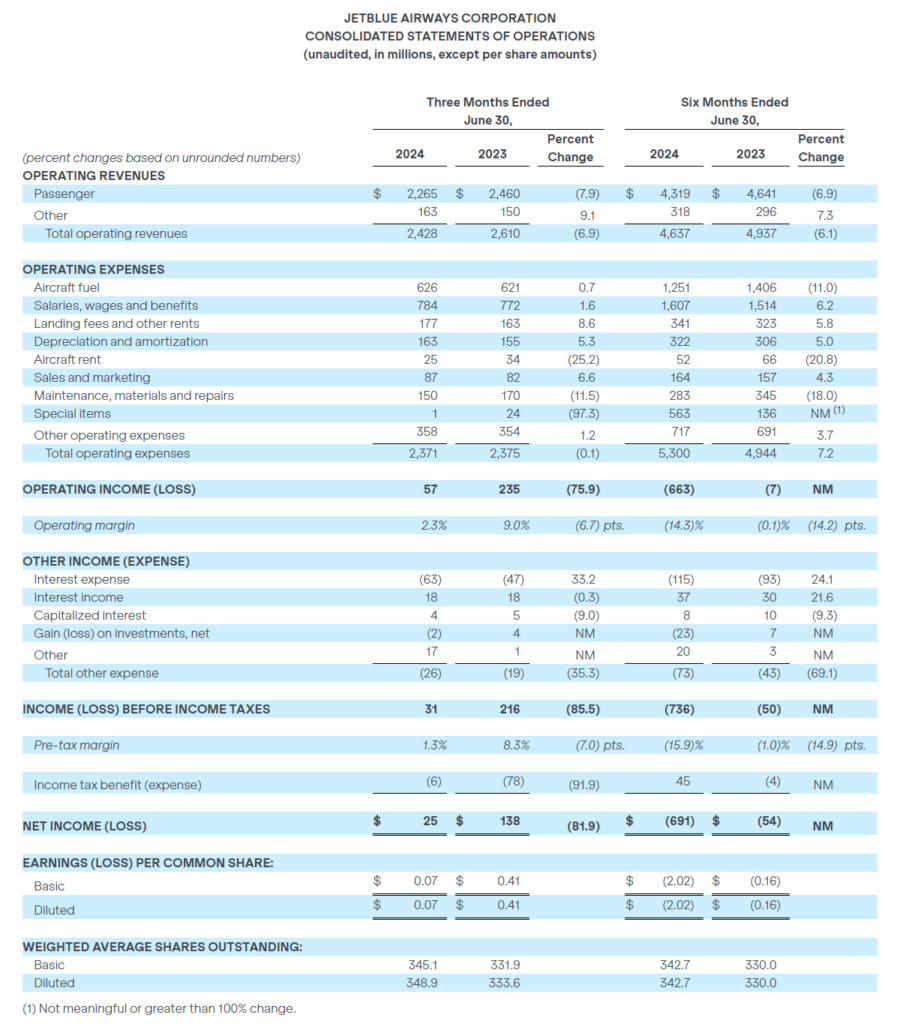
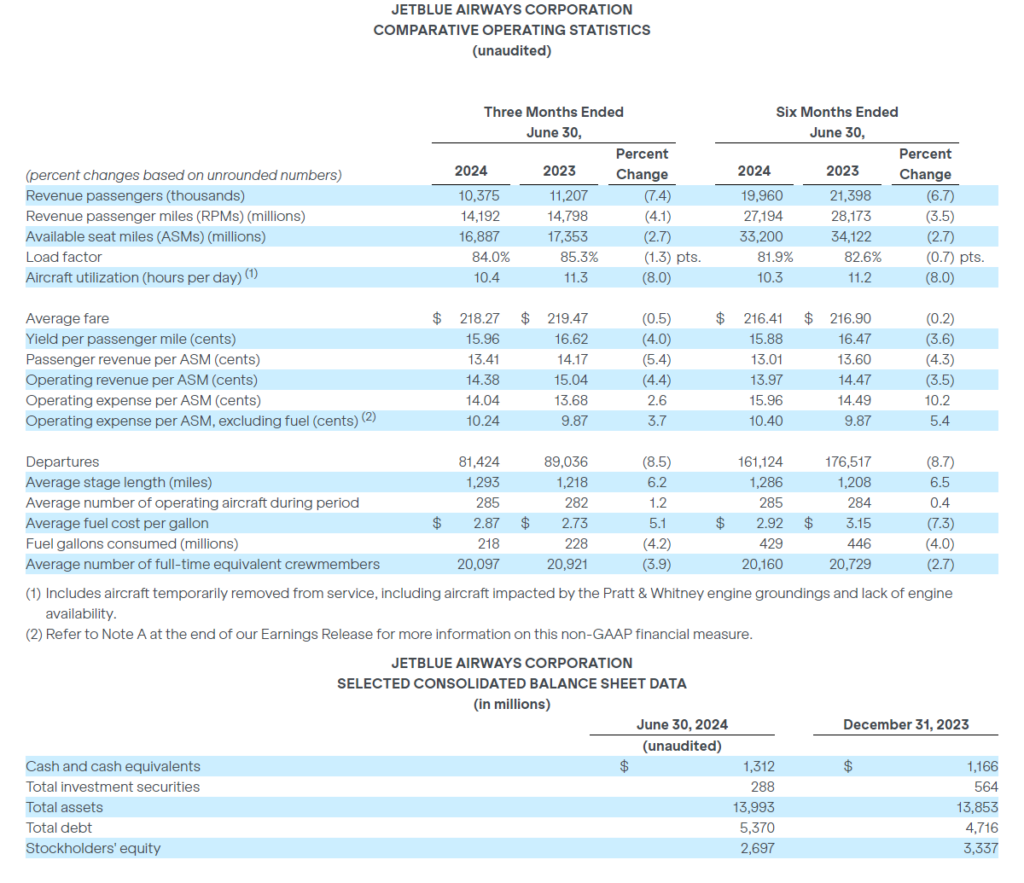
Note A – Non-GAAP Financial Measures
We report our financial results in accordance with GAAP; however, we present certain non-GAAP financial measures in this Earnings Release. Non-GAAP financial measures are financial measures that are derived from the condensed consolidated financial statements, but that are not presented in accordance with GAAP. We present these non-GAAP financial measures because we believe they provide useful supplemental information that enables a meaningful comparison of our results to others in the airline industry and our prior year results. Investors should consider these non-GAAP financial measures in addition to, and not as a substitute for, our financial measures prepared in accordance with GAAP. Further, our non-GAAP information may be different from the non-GAAP information provided by other companies. The information below provides an explanation of each non-GAAP financial measure used in this Earnings Release and shows a reconciliation of each non-GAAP financial measure used in this Earnings Release to the most directly comparable GAAP financial measure.
With respect to Jet Blue’s CASM Ex-Fuel (1) guidance and EBIT (2) targets, JetBlue is not able to provide a reconciliation of forward-looking measures where the quantification of certain excluded items reflected in the measures cannot be calculated or predicted at this time without unreasonable efforts. In these cases, the reconciling information that is unavailable includes a forward-looking range of financial performance measures beyond our control, such as interest rates and fuel costs, which are subject to many economic and political factors beyond our control. For the same reasons, we are unable to address the probable significance of the unavailable information, which could have a potentially unpredictable and potentially significant impact on our future GAAP financial results.
| (1) | CASM Ex-Fuel is a non-GAAP measure that excludes fuel, other non-airline operating expenses, and special items. | |
| (2) | EBIT is a non-GAAP measure that excludes interest and income taxes from net income. |
Operating expense per available seat mile, excluding fuel, other non-airline operating expenses, and special items (“CASM ex-fuel”)
CASM is a common metric used in the airline industry. Our CASM for the relevant periods are summarized in the table below. We exclude aircraft fuel, operating expenses related to other non-airline businesses, such as JetBlue Technology Ventures and JetBlue Travel Products, and special items from total operating expenses to determine Operating expenses ex-fuel, which is a non-GAAP financial measure, and we exclude the same items from CASM to determine CASM ex-fuel, which is also a non-GAAP financial measure. We believe the impact of these special items distorts our overall trends and that our metrics are more comparable with the presentation of our results excluding such impact.
We believe Operating Expenses ex-fuel and CASM ex-fuel are useful for investors because they provide investors the ability to measure our financial performance excluding items that are beyond our control, such as fuel costs, which are subject to many economic and political factors, as well as items that are not related to the generation of an available seat mile, such as operating expense related to certain non-airline businesses and special items. We believe these non-GAAP measures are more indicative of our ability to manage airline costs and are more comparable to measures reported by other major airlines.
For the three months ended June 30, 2024, special items included voluntary opt-out costs. For the six months ended June 30, 2024, special items included Spirit-related costs, voluntary opt-out costs, and Embraer E190 fleet transition costs.
For the three months ended June 30, 2023 special items included Spirit-related costs. For the six months ended June 30, 2023, special items included union contract costs and Spirit-related costs.
The table below provides a reconciliation of our total operating expenses (GAAP measure) to Operating Expenses ex-fuel, and our CASM to CASM ex-fuel for the periods presented.
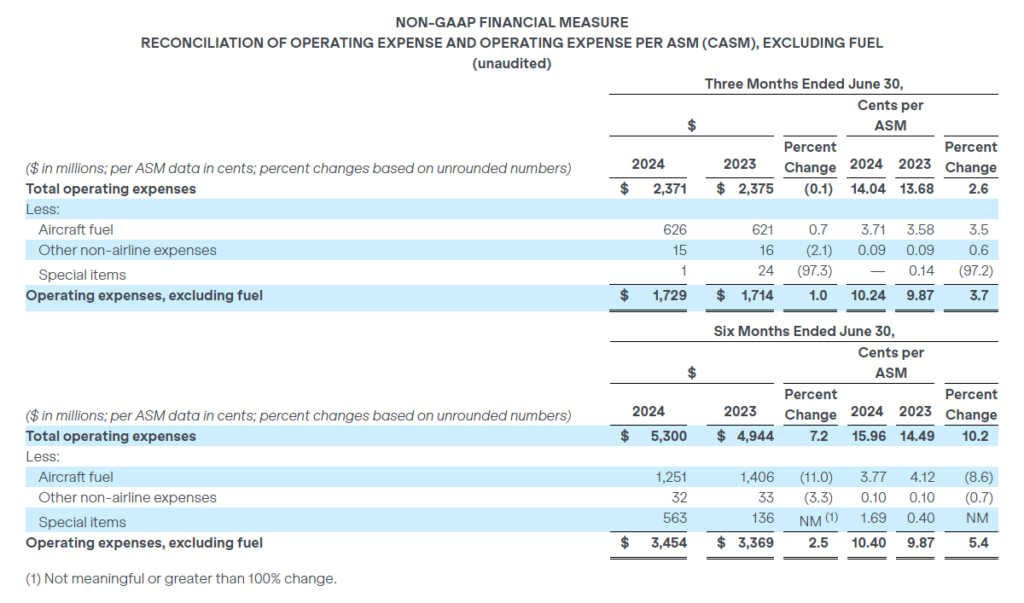
Operating Expense, Operating Income (Loss), Adjusted Operating Margin, Pre-tax Income (Loss), Adjusted Pre-tax Margin, Net Income (Loss) and Earnings (Loss) per Share, excluding Special Items and Gain (Loss) on Investments
Our GAAP results in the applicable periods were impacted by credits and charges that were deemed special items.
For the three months ended June 30, 2024, special items included voluntary opt-out costs. For the six months ended June 30, 2024, special items included Spirit-related costs, voluntary opt-out costs, and Embraer E190 fleet transition costs.
For the three months ended June 30, 2023 special items included Spirit-related costs. For the six months ended June 30, 2023, special items included union contract costs and Spirit-related costs.
Certain net gains and losses on our investments were also excluded from our June 30, 2024 and 2023 non-GAAP results.
We believe the impact of these items distort our overall trends and that our metrics are more comparable with the presentation of our results excluding the impact of these items. The table below provides a reconciliation of our GAAP reported amounts to the non-GAAP amounts excluding the impact of these items for the periods presented.
